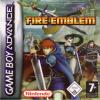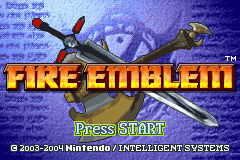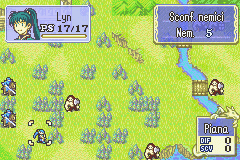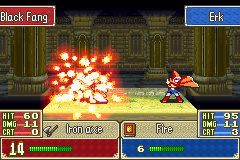Forum Links
Thread Information
Views
1,122
Replies
2
Rating
2
Status
OPEN
Thread
Creator
Creator
FlowerPrincess
12-02-13 01:34 PM
12-02-13 01:34 PM
Last
Post
Post
janus
01-25-16 10:51 PM
01-25-16 10:51 PM
System
9.5
Views: 568
Today: 0
Users: 3 unique
Today: 0
Users: 3 unique
Thread Actions
Order
Fire Emblem - Review
Game's Ratings
Overall
Graphics
Sound
Addictiveness
Depth
Story
Difficulty
Average User Score
9.5
8.6
8.6
9.4
8.8
9
7.8
12-02-13 01:34 PM
FlowerPrincess is Offline
| ID: 934818 | 2058 Words
| ID: 934818 | 2058 Words
FlowerPrincess
Level: 4




POSTS: 1/2
POST EXP: 4172
LVL EXP: 198
CP: 2994.8
VIZ: 255071
POSTS: 1/2
POST EXP: 4172
LVL EXP: 198
CP: 2994.8
VIZ: 255071

Likes: 2 Dislikes: 0
In the distant past, the land of Elibe was ravaged by a devastating war known as The Scouring: Men and Dragons fought hard against each other, and the war was finally over after the latter were defeated and then never heard of again... Flash forward over a thousand years after the war, and the player, a newbie tactician, stumbles upon a lovely girl named Lyndis, who lives on her own at the planes of Sacae. The arrival of two knights from the kingdom of Caelin who inform Lyn of her royal ancestry, prompt her to seek her rightful place as ruler of the kingdom and ask her to prevent her evil uncle's rise to power are but the first in a series of events that shall bring great change in the land, for better or for worse... Released in the US at the winter of 2003, Fire Emblem is the seventh installment in the Fire Emblem franchise, a popular turn-based tactical RPG series in Japan (where it was released with the subtitle Rekka no Ken, which translates to Blazing Sword), and the first to be exported to the English-speaking world. And it shows: you can tell there's an expansive world as you play, but thankfully that really isn't much of a hindrance. Quite the contrary, actually: you will either spend quite a few time in the special Fire Emblem Wikis to find more about the history of the nations, or seek out the previous games. It may take some time to learn which faction is allied to whom and why, and which lord governs which castle, but after a while the player gets drawn into the world and learns to recognise the names. The story focuses on a few And even if they don't, there's always the characters to keep the player interested. While not exactly having the deepest of personalities, the people that gather around the tactician are all interesting and lovable. They all have a clearly defined goal, a few quirks to tell them apart, and have great chemistry with each other. From the calm and collected monk Lucian to hilarious and honey-tongued (not always successful, but he tries so damn hard!) womanizer Sain to dedicated and strong Lyndis, troubled troubadour Priscilla, mysterious and stoic horse rider Rath, innocent but just young lord Eliwood, big brother figure knight Oswin, brash and impulsive but ultimately good-natured Hector, bright archer Rebecca, and even "For goodness sake, what have I even gotten myself into?" Erk or Sera, a healer with alarmingly tsundere-ish sensibilities, almost all of the characters are memorable and a lot of fun. You might be tempted more than once to keep a unit in your team just because you have grown to love them a lot and can't force yourself to leave them behind. The brand-new (for the franchise) Support System even encourages the player to keep certain characters who happen to like each other together for a long time, both as a way to increase their stats and also progress each character's individual storyline. It's this adorable way that the characters bounce off of each other that can force one to play the game quite a few times, just to see all the different interactions and the resolutions to the different story lines that greatly enhance the gaming experience. But Fire Emblem is not a visual novel, it's a strategy RPG first and foremost, and its real potential as a great game is revealed at the battling grounds. As the heroes make their way through diverse terrains (planes, mountains, hilltops, beaches, thick forests, deserts) and varying weather conditions (sunshine, rain, fog, snow), they will have to battle foes of increasing difficulty. This is where the game asks of the player to be at their most active, arranging the positions of the allies you have gathered in your journey in a chessboard-like arena to face your opponents and win under certain, specified conditions. You will have to carefully use every unit, item and terrain at your disposal (or as many as the game limits you to, since there are number restrictions) and be victorious, while also having as few casualties as possible and managing your budget well. After a while, you will even be rated based on five criteria with stars (from one to five): Tactics (how many turns you have taken to finish the game so far), Survival (the fewer allies have died, the higher the rating), Funds (how much money you have, both in cash form and as the total price of items at your collective inventory), Experience (how much experience your characters have gathered from their battles), and Combat (how good you are in single combat with the enemy). The first section of the game is largely a tutorial: the enemies never quite flood the team, allies are added to the group generously, items and money are bountiful. It is in the second section of the game where the game show its true complexity, and things get rather difficult. Organizing your team is one of the most important things to consider before entering the field of battle. The various characters are divided into Classes, groups of characters who share roughly the same attributes. Each has special advantages and disadvantages over other opponents and team mates. For example, Pegasi Knights ride on flying horses, therefore they can traverse very long distances in comparison to most units and come to their friends' aid, but they are rather frail warriors and very susceptible to the Archer's arrows. Here's another example: magic users can use magic to attack from a distance and defeat an opponent while he hasn't yet reached them, but they are weak against direct physical hits. One can organise their team in any way they so desire before any battle in a special screen, and there is no set strategy to beat the game, so one is free to experiment. Take your time to use every new recruit you become allies with and familiarize yourself with as many different and diverse battle styles you can. Of special mention is the Weapon system. Not all Classes can use all equipment, and they also can use them to better effect than others. The same applies to magic. Furthermore, both Weapons and Magic have strengths and weaknesses. For example, Swords are stronger against Axes, while Axes are stronger against Lances, and Lances are stronger against Swords, a la rock-paper-scissors. This is called the Weapons Triangle. It is best to either make notes of these pieces of information whenever they appear on screen or memorize them for future reference, as they can prove invaluable to get a player out of a pinch. Moreover, one always need to keep an eye out for the amount of times a character can use an item. Unfortunately, weapons can break if one uses them for too long, and the same rule applies to magic books used for spell casting. Thankfully, one can turn to nearby villagers who can donate useful weapons and items if you visit their homes and talk to them, or buy anything they need from shops scattered all over the maps. One can inspect the area before a battle and find out where the shops are and how to get there, and even move items between the units, so that they all have what they can actually use. As if the game wasn't challenging enough, there's also the feature of permanent death. If a character dies during a battle, they cannot be brought back to life, you lose all of the items they were carrying, and you cannot progress their individual story line. This is a rather divisive addition to the game play: some players adore it, as it makes every turn count and every decision more important, while others loathe it, because it punishes even the smallest mistake and forces them to replay entire campaigns if something goes wrong. This is the reason why the game focuses on a few Thankfully, one can also strengthen their team during the course of the game, as the great number of opponents can be reduced with clever tactics and a few good knocks to the head. Whenever a character enters single combat (an event that is triggered when two units are adjacent to each other, or within a specified range that varies with the character's Class), they get awarded experience points, which lead to leveling up and stats boosts. As units grow, they can even receive special items that allow them to change into more powerful Classes and get even stronger. This is an RPG, after all, so make sure you grind every once in a while. Also make sure to unlock hidden levels by performing exceptionally in specific maps. These extra missions have significantly harder opponents for you to face, but also feature big rewards, both in the form of items and training experience, and are worth the risk. As one can see, Fire Emblem has quite a deep and complicated game play, and while it might strike a few gamers as too familiar with that of Advance Wars (the previous hit by developers Intelligence Systems), it manages to feel fresh and different thanks partly to its presentation. In contrast to the more cartoony and round art style found in Advance Wars, Fire Emblem adapts an art style reminiscent of anime artwork for the dialogue scenes and the cut scenes, and short sprites for the battle maps, with small changes for the single combats. They all look exceptional. The visual novel-like dialogue scenes feature handsome character designs, with big expressive eyes and many details indicating a character's social status. Even the villains and the side characters get their share of memorable portraits. The bright and pleasing colours are also a big plus. The sprites are distinguished by Class and while they lack the details found on the artwork before, they still have a lot of charm. "Charming" would be a fitting word to describe the art of the game in general, actually. The single combat scenes feature wonderful animation for the attacks (which can be turned off if one is bored), and you sometimes wish to enter battle only to see these delicate sprites vanquish entire armies with their awesome swordplay or magic moves. Also of note are the lovingly drawn static shots of certain important events in the story: while having a different colour pallet than the portraits (they give off the feel of old, saturated photographs, or half-remembered memories), they look very good and immediately catch the eye, as they emphasize the importance of certain events in the story. As for the music, the tunes used are catchy and upbeat, though some battle themes may get tiring the millionth time one gets to hear them. Still, there are some pretty nice and delicate tunes to be found here, like Ninian's theme. I think it's time for a personal confession: I thought I'd be bored out of my skull before I played Fire Emblem. I never was one to play strategy games, and the thought of losing a character I had grown to love for ever was pretty daunting. Still, I don't think there's a bigger recommendation to be made than by someone who changed their mind after trying. Fire Emblem is an addictive, exciting game, a journey with some lovable characters, and a window to an entire new plane in gaming more people should venture to. |
Newbie
Affected by 'Laziness Syndrome'
Registered: 08-26-12
Last Post: 4436 days
Last Active: 35 days
Affected by 'Laziness Syndrome'
Registered: 08-26-12
Last Post: 4436 days
Last Active: 35 days
01-23-16 02:46 PM
 Postman3 is Offline
| ID: 1240073 | 42 Words
Postman3 is Offline
| ID: 1240073 | 42 Words
 Postman3 is Offline
Postman3 is Offline
| ID: 1240073 | 42 Words
Postman3
Level: 50





POSTS: 268/523
POST EXP: 125939
LVL EXP: 910428
CP: 12781.9
VIZ: 377771

POSTS: 268/523
POST EXP: 125939
LVL EXP: 910428
CP: 12781.9
VIZ: 377771

Likes: 0 Dislikes: 0
FlowerPrincess : This game sounds really good. I wonder why no one responded here in the last two years. You write excellently and your diligence in spelling is admirable. Thank you for typing this review. It was a genuine pleasure to read. P3 |
Vizzed Elite
Affected by 'Laziness Syndrome'
Registered: 03-21-10
Location: Brittania
Last Post: 156 days
Last Active: 146 days
| Sir Postman |
Affected by 'Laziness Syndrome'
Registered: 03-21-10
Location: Brittania
Last Post: 156 days
Last Active: 146 days
01-25-16 10:51 PM
janus is Offline
| ID: 1240851 | 91 Words
| ID: 1240851 | 91 Words
janus
SecureYourCodeDavid
SecureYourCodeDavid
Level: 127




POSTS: 3990/4824
POST EXP: 567677
LVL EXP: 23201406
CP: 64113.9
VIZ: 610892
POSTS: 3990/4824
POST EXP: 567677
LVL EXP: 23201406
CP: 64113.9
VIZ: 610892

Likes: 0 Dislikes: 0
Damn, I'm speechless! Not only is this your first post (and review!) but I daresay you do it MUCH better than I do. You wrote your review like a story, with paragraphs logically following each other. You go into minute details of the game without even getting boring. And since I was looking into playing FE in the near future, you surely pumped up my interest. If ever you played the game: would the "rating" system at the end of battle be comparable to Front Mission III where you earn medals? |
Site Staff
YouTube Video Editor
Affected by 'Carpal Tunnel Syndrome'
Registered: 12-14-12
Location: Murica
Last Post: 5 hours
Last Active: 5 hours
YouTube Video Editor
| the unknown |
Affected by 'Carpal Tunnel Syndrome'
Registered: 12-14-12
Location: Murica
Last Post: 5 hours
Last Active: 5 hours


 User Notice
User Notice 






